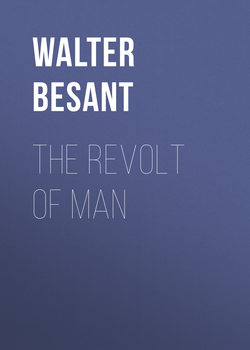The Revolt of Man

Реклама. ООО «ЛитРес», ИНН: 7719571260.
Оглавление
Walter Besant. The Revolt of Man
PREFACE
CHAPTER I. IN PARK LANE
CHAPTER II. THE EARL OF CHESTER
CHAPTER III. THE CHANCELLOR
CHAPTER IV. THE GREAT DUCHESS
CHAPTER V. IN THE SEASON
CHAPTER VI. WOMAN’S ENGLAND
CHAPTER VII. ON THE TRUMPINGTON ROAD
CHAPTER VIII. THE BISHOP
CHAPTER IX. THE GREAT CONSPIRACY
CHAPTER X. THE FIRST SPARK
CHAPTER XI. A MARRIAGE MARRED
CHAPTER XII. IN THE CAMP AT CHESTER TOWERS
CHAPTER XIII. THE NIGHT BEFORE THE BATTLE
CHAPTER XIV. THE ARMY OF AVENGERS
CONCLUSION
Отрывок из книги
BREAKFAST was laid for two in the smallest room – a jewel of a room – of perhaps the largest house in Park Lane. It was already half-past ten, but as yet there was only one occupant of the room, an elderly lady of striking appearance. Her face, a long oval face, was wrinkled and crow-footed in a thousand lines; her capacious forehead was contracted as if with thought; her white eyebrows were thick and firmly drawn; her deep-set eyes were curiously keen and bright; her features were strongly marked, – it was a handsome face which could never, even in early girlhood, have been a pretty face; her abundant hair was of a rich creamy white, the kind of white which in age compensates its owner for the years of her youth when it was inclined to redness; her mouth was full, the lower lip slightly projecting, as is often found with those who speak much and in large rooms; her fingers were restless; her figure was withered by time. When she laid aside the paper she had been reading, and walked across the room to the open window, you might have noticed how frail and thin she seemed, yet how firmly she walked and stood.
This wrinkled face, this frail form, belonged to the foremost intellect of England; the lady was none other than Dorothy Ingleby, Professor of Ancient and Modern History in the University of Cambridge.
.....
‘Poor man!’ groaned Constance. ‘Stay; I have a few hours yet of power. His name? she sprang to her desk.
‘John Phillips – no; Phillips is the wife’s name. I forgot that the sentence itself carries divorce with it. His bachelor name was Coryton.’
.....